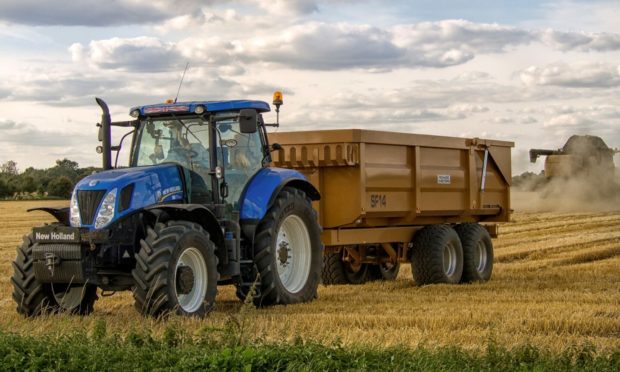Rural crime across Scotland by nearly a quarter during lockdown – but there are fears this will soar again as restrictions lift.
Organised criminals continued to target Scotland’s farms over the pandemic, stealing high-value tractors, quad bikes, tools and livestock.
However, such crimes fell by a quarter to around £1.7million.
Across the UK, they still cost an estimated £43.3million – a fall of 20.3% on the previous year, making it the lowest annual cost in five years.
It is believed that Covid restrictions, rural policing and beefed up farm security played a part in the rural figures.
But with fears they will rise again as restrictions ease, NFU Mutual is investing more than £64,000 in the fight against rural crime in Scotland this year through Scottish Partnership Against Rural Crime (SPARC).
Economic impact of Covid could hit farming communities
Mark McBrearty, NFU Mutual regional manager in Scotland, said: “While lockdown may have locked some criminals out of the countryside – rural crime hasn’t gone away. Thieves are now returning armed with new tactics and targets.
“As the economic impact of the pandemic bites, we are very concerned that rural theft may escalate significantly.
“There’s no doubt that when we work together with police, rural communities, NFU Scotland and other rural organisations to tackle rural crime it can make a real difference.
Last year there was a spike in other crimes including fly-tipping and dog attacks on livestock as pet owners embraced the great outdoors.
Farmers also reported a surge in thefts of Land Rovers.
NFU Mutual claims data shows the cost of dog attacks on sheep and cattle continued to worsen this year with a UK rise of 50% in the first quarter of 2021 compared to the same period last year.
Fly-tipping in fields, gateways and country lanes reached epidemic proportions as waste recycling centres restricted access, leaving farmers to deal with the clean-up and risks to their health and that of their livestock and the environment.
Collaborative crackdown
NFU Mutual and Police Scotland are now working together to protect farmers from thieves.
Inspector Alan Dron, national rural crime coordinator at Police Scotland, said:
“It’s fair to say 2020 was a year like no other and as always it is encouraging to see a decline in Scotland’s rural crime figures.
“Early Covid restrictions definitely contributed due to lack of movement however as restrictions eased and society was encouraged to stay local, get out into the rural communities and environments, the contribution of those living, working and enjoying these areas has also played a huge part as more incidents and suspicious behaviour was reported to policing, Rural Watch or Crimestoppers.
“The ongoing work of the Scottish Partnership Against Rural Crime (SPARC) and the 14 local partnerships now operating throughout the country continues to make a tangible and visible difference through better cohesion, coordination and cooperation between all relevant partners in terms of how Scotland collectively tries to prevent, reduce and tackle rural crime.
Mr McBrearty urged people exploring the countryside to support crofters by reporting suspicious activity to the police.
He added: “With more and more people using the countryside, we are urging the public to support farmers and rural communities by reporting suspicious sightings and crimes to the police.
“Scotland’s farmers have worked tirelessly throughout the pandemic keeping the nation fed and caring for the countryside and by working together, we can help stem the tide when the criminals become more active again.”
